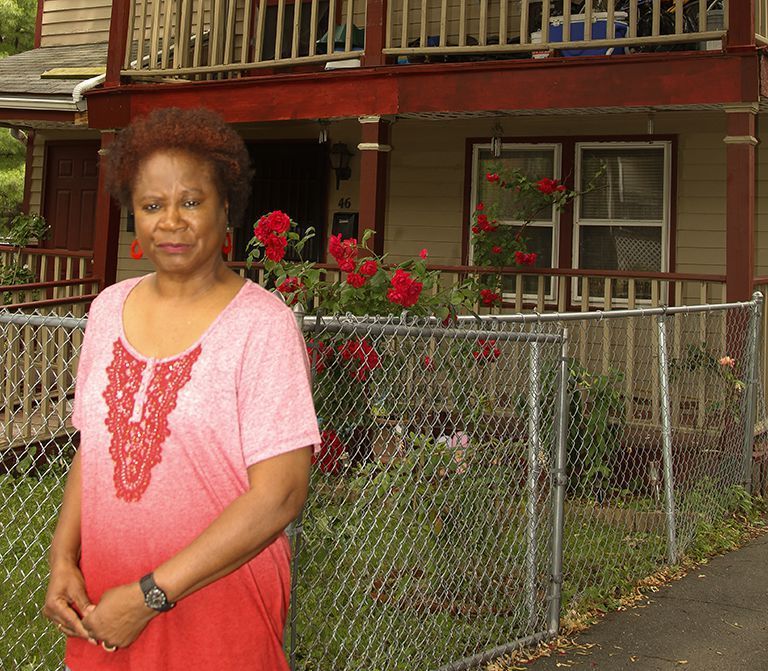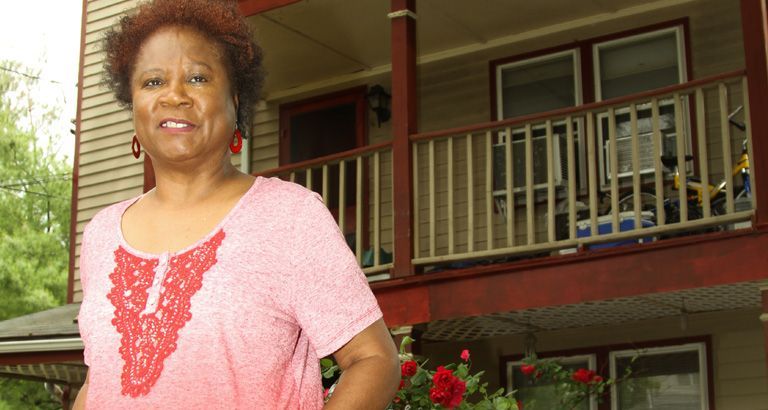
Rosalind Cobb was shocked the day in June 2013 when she arrived at her home to find a foreclosure notice in the doorway of her 3-family property in Hartford's northend. Cobb had owned the Enfield Street house for more than 20 years, and had been diligent in making payments on time. That is, until the recession. A few years ago, like millions across the country, Rosalind Cobb and her family had experienced a series of hardships: after 31 years with Travelers, she was included in a large round of layoffs, and an adult daughter who rented one of the two apartments upstairs was diagnosed with breast cancer, losing her job after enduring multiple surgeries.
The family kept up with bills as best they could, but for a time fell behind on their mortgage and property taxes. While the Connecticut Housing Finance Authority (CHFA) worked with Cobb on her first mortgage, the City liened the property for back taxes, then sold the Cobbs' liens – with hundreds of others - to Florida-based American Tax Funding (ATF). For several years ATF had quietly held the liens – which accrue interest at 18% - and then initiated the foreclosure action.
"I was trying to pay ATF some on the delinquent tax bill and also still pay the City on the current taxes," Cobb explained, "and I thought I was set up with ATF to make payments to them. So when I got the letter from their attorney about the foreclosure, I was so confused. I called ATF, but they said they couldn't talk to me since they were taking me to court. They said to look on the back of the summons for a list of places to call for help." Cobb began contacting every organization on the list, but "nobody could help us. They all said they were no longer taking clients for foreclosure, or else they had closed."
She learned from local activists that her northend neighborhood was facing a sizeable rash of foreclosures as American Tax Funding had "pulled in its papers."
Unsure where else to turn, Cobb even approached Hartford Mayor Pedro Segarra at an event in nearby Keney Park. "I didn't know what else to do. My friend encouraged me . . . said the Mayor was a good person and would listen," she said. After an email exchange, Segarra put Cobb in contact with Yasha Escalara, Director of the Housing and Property Management Division for the City of Hartford. Because the City is restricted from providing financing for payment of property taxes, Escalara contacted Hartford Community Loan Fund (HCLF) to see if the Loan Fund might help the long-time Hartford homeowner.

Research conducted in 2013 by HCLF revealed that over 1,000 property owners citywide had outstanding tax liens held by outside investors, including ATF.
HCLF was familiar with the impact of foreclosures resulting from the City's policy of tax lien sales. In the fall of 2012 HCLF had been approached by Butch Lewis, a longtime northend resident who had received notice of foreclosure on his Vine Street home of 40 years, resulting from tax liens he didn't know existed, but that had also been sold to ATF. Research conducted in 2013 by HCLF revealed that over 1,000 property owners citywide had outstanding tax liens held by outside investors, including ATF. More than 300 of those, like Butch Lewis, had foreclosure actions filed against them. Many of these were elderly homeowners, and the majority were in the city's northend neighborhoods.
Working with City officials, in 2013 HCLF created a Tax Lien Refinance initiative available to Hartford property owners facing foreclosure by tax lien investors; consequently Naveed Sobhan, Director of Mortgage Lending for HCLF, was prepared to help when Cobb reached out to the organization. By that time Cobb had almost given up hope. After four months of explaining her case to multiple lawyers and community organizations, filing appeals, attending workshops, and waiting for return phone calls that never came, she would lie awake at night wondering what her family would do – where would they move?
"But then I started getting calls back from Naveed," said Cobb. "You don't know how important that was," she continued, "to have someone you can communicate with. He told me step-by- step how difficult my case was, but he worked with me to help me understand what we needed to do to save my house."
"I wish there were workshops to help us check in on our finances, so you'd know if you're doing it the right way, not to mention help you when you're facing foreclosure. The people who were supposed to help couldn't do much for us, and I didn't know what to make of all the legal language." HCLF's Sobhan agreed and added, "A problem that we face all the time is how very little help there is for people facing foreclosure. There's clearly a need for more high quality financial coaching resources in our community." Sobhan mentioned that, like the Cobbs and Butch Lewis, many Hartford homeowners facing tax lien foreclosure maintain good credit and have a strong track record of paying their bills on time.
HCLF's foreclosure prevention plan would require collaboration with Mrs. Cobb's existing mortgage lenders, CHFA and the City of Hartford, along with the Connecticut Housing Investment Fund (CHIF), which serviced both mortgages. The entire process took Mrs. Cobb and HCLF staff nearly nine months to complete, but in June, 2014 – a year after receiving the initial foreclosure notice at her front door – Rosalind Cobb closed on an affordable foreclosure prevention loan with HCLF that paid off the 18% tax lien obligation that had threatened her family with the loss of their home.
Rosalind Cobb, her daughter, and her long-time third floor tenant were relieved they could forgo the chore of packing moving boxes, and Mrs. Cobb has since slept much more peacefully at night, confident they'll all be in their Enfield Street home for many years to come.
SHARE



